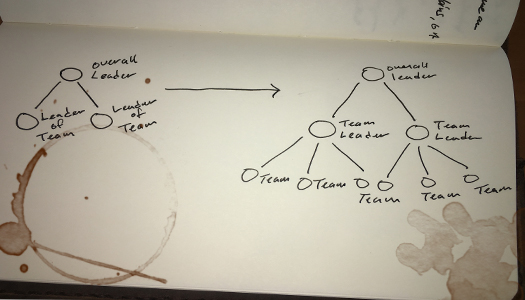
Caleb and Joshua’s birthday is coming up, and when they were younger every time we would go to the grocery store, Wal-mart, Burger King, or when they would see a commercial on TV; they would say almost constantly, “Dad, I want that for my birthday,” “I want that, I want that, dad I want that” and I may say, “Caleb do you really want a Shrek foam lamp?” or “Joshua do you really want that movie, it will give you nightmares?”
Many of our prayers are like that, “ Lord, I want this, and this, and that, and can you do this, and that” . . .on and on we go, while God is sitting there saying, “Are you sure you want to have that, or do this, or go there?” “I have such a bigger vision for your life than a Shrek foam lamp, I want to pour out my goodness on your life and give you this.” As you consider your walk with the Lord and the things you ask of Him, consider the following from 1 Kings 3. He desires to use flawed people to accomplish unimaginable things. He desires to use you to do the wonderful. But there is a process.
What Kind of Leader Would Solomon Be? (vv. 1-4)
“1 Solomon made an alliance with Pharaoh king of Egypt and married his daughter. He brought her to the City of David until he finished building his palace and the temple of the LORD, and the wall around Jerusalem. 2 The people, however, were still sacrificing at the high places, because a temple had not yet been built for the Name of the LORD. 3 Solomon showed his love for the LORD by walking according to the statutes of his father David, except that he offered sacrifices and burned incense on the high places. 4 The king went to Gibeon to offer sacrifices, for that was the most important high place, and Solomon offered a thousand burnt offerings on that altar.”
The book of I Kings opens with David making Solomon king, David giving his son some instructions and making a few requests of his son, and Solomon then doing some housekeeping. And in today’s text we get a first glimpse of what kind of king Solomon was to be.
An Alliance with Egypt
When God was giving the people the law, he warned that the people would one day want a king, and he warned the people not to let him do certain things. Deuteronomy 17:16 “The king, moreover, must not acquire great numbers of horses for himself or make the people return to Egypt to get more of them, for the LORD has told you, “You are not to go back that way again.” To go back to Egypt was to return to a place of slavery. But here we see that Solomon sees the need to marry the daughter of Egypt.
2 Chronicles 1:14-16 “Solomon accumulated chariots and horses; he had fourteen hundred chariots and twelve thousand horses, which he kept in the chariot cities and also with him in Jerusalem. 15 The king made silver and gold as common in Jerusalem as stones, and cedar as plentiful as sycamore-fig trees in the foothills. 16 Solomon’s horses were imported from Egypt and from Kue’ the royal merchants purchased them from Kue.”
Married to Foreign (Women)
1 Kings 11:1-2 “King Solomon, however, loved many foreign women besides Pharaoh’s daughter, Moabites, Ammonites, Edomites, Sidonians and Hittites. 2 They were from nations about which the LORD had told the Israelites, “You must not intermarry with them, because they will surely turn your hearts after their gods.” Nevertheless, Solomon held fast to them in love.”
Solomon marries these women from foreign lands. Just as an aside, this is not a racial issue — it has to do with the false gods these women worshiped.
Performing Burnt Offerings to Foreign gods
God wanted the people to worship and sacrifice on the altar of the tabernacle, in the manner He commanded Moses, but even more so, He wanted their obedience. Every time we see sacrifices mentioned in the Bible, we need to remember that this is part of God’s concession, and not His will, as we are told in 1 Samuel 15:22 “Does the LORD delight in burnt offerings and sacrifices as much as in obeying the voice of the LORD ? To obey is better than sacrifice, and to heed is better than the fat of rams.”
Duet. 12:1-2, 4 “These are the decrees and laws you must be careful to follow in the land that the LORD, the God of your fathers, has given you to possess, as long as you live in the land. 2 Destroy completely all the places on the high mountains and on the hills and under every spreading tree where the nations you are dispossessing worship their gods. . . 4 You must not worship the LORD your God in their way.
But Solomon once again ignores God’s Word, “. . . . except that he offered sacrifices and burned incense on the high places”
The Presence of “High Places”
“The king [Solomon] went to Gibeon to offer sacrifices.” We first see the city of Gideon in the Bible when they fool Joshua in Joshua 9:14 “The men examined some of their [Gibeonites] provisions, but they failed to ask the Lord’s advice.” God’s command to Joshua and the rest of the people was to clear out the promised land of foreign people who worshipped foreign gods. This group of people was allowed to stay, and now the king of God’s chosen people is there worshipping their gods.
Here are four examples where the leader ignores God’s Word and decides to do what “seems right in his own eyes.” But, how do we explain that God is about to appear before Solomon, he is going to bless him in ways that no other man has ever known, and yet we see him here, he is clearly going against God and His ways? The first time we really see Solomon acting as king, he is messing up big time.
Do you ever feel that way as a leader? You may not see at the time, but if you look back over your life you see mess ups, mistakes, bad calls, and just plain sinfulness. Can God use you? Is it possible to overcome these things?
Read on friend.
The King Makes a Wish (vv. 5-9)
5 At Gibeon the LORD appeared to Solomon during the night in a dream, and God said, “Ask for whatever you want me to give you.” 6 Solomon answered, “You have shown great kindness to your servant, my father David, because he was faithful to you and righteous and upright in heart. You have continued this great kindness to him and have given him a son to sit on his throne this very day. 7 “Now, O LORD my God, you have made your servant king in place of my father David. But I am only a little child and do not know how to carry out my duties. 8 Your servant is here among the people you have chosen, a great people, too numerous to count or number. 9 So give your servant a discerning heart to govern your people and to distinguish between right and wrong. For who is able to govern this great people of yours?”
“The king went to Gibeon to offer sacrifices” While Solomon was on the high place, going against what God’s Word and Commandments clearly teach, sacrificing animals to other gods, “At Gibeon the LORD appeared to Solomon.”
Romans 10:20 “And Isaiah boldly says, “I was found by those who did not seek me; I revealed myself to those who did not ask for me.”
God in His grace and mercy came to Solomon, when Solomon would not come to the Lord in His Temple. And even though Solomon had sinned against Him, the Lord said, “I want to bless your life greatly!” he said, “Sinner, I want to use you, I want to bless you, I want to use you greatly!
This is one reason why I love the Bible, God loves to reach down and take sinful people and bless them and that’s what happened to the Apostle Paul in Acts 9:1-4 “Meanwhile, Saul was still breathing out murderous threats against the Lord’s disciples. He went to the high priest 2and asked him for letters to the synagogues in Damascus, so that if he found any there who belonged to the Way, whether men or women, he might take them as prisoners to Jerusalem. 3As he neared Damascus on his journey, suddenly a light from heaven flashed around him. 4He fell to the ground and heard a voice say to him, “Saul, Saul, why do you persecute me?”
Abraham, who was worshipping other gods is called, Joshua 24:2 “Joshua said to all the people, “This is what the LORD, the God of Israel, says: ‘Long ago your forefathers, including Terah the father of Abraham and Nahor, lived beyond the River and worshiped other gods.”
God’s words didn’t come through a prophet, or a seer, God appeared to him in person. And He simply said to Solomon, “ask for whatever you want me to give to you.” Have you ever heard the teaching on prayer, that says, God answers prayer with yes, no, or wait? Many times God desires to bless us, or use us in a powerful way, but we have to grow into it, or be able to handle it. God desires for us to learn things about ourselves and what He desires to do through us.
What if God were to come to you, and say, “ask for whatever you want me to give to you.” Jesus put it this way, Mark 11:22 “Have faith in God,” Jesus answered. 23“I tell you the truth, if anyone says to this mountain, ‘Go, throw yourself into the sea,’ and does not doubt in his heart but believes that what he says will happen, it will be done for him. 24Therefore I tell you, whatever you ask for in prayer, believe that you have received it, and it will be yours.“
In this process of talking with God Solomon recognizes four things about himself:
(1) “You have shown great kindness to your servant, my father David, because he was faithful to you . . . a son to sit on his throne this very day” — Solomon recognizes that he is in a position that he did not earn, deserve, “ it was because of someone else’s righteousness, his father David, that he is able to be where he is. When we spend time with God we quickly encounter His greatness and our humanity.
(2) “Now, O LORD my God, you have made your servant king,” He recognizes that he was king, whether he deserved to be there or not, whether someone else could do a better job, no matter what his view of himself was, he was there, on the thrown and he was king. If you find yourself to be the leader then God expects you to lead.
(3) “But I am only a little child and do not know how to carry out my duties.” He recognizes that in his responsibilities, he does not know how to do it well. He feels like a child, inadequate, and fumbling. In most things that relate to leadership, people, and the spiritual, we humans are this way. Those that think they “have arrived” or are “experts” will eventually discover that it is by God’s grace that they have had success.
(4) “8Your servant is here among the people you have chosen, a great people, too numerous to count or number.” Solomon recognizes that the task before him is a great one. He feels overwhelmed and doesn’t know what to do. God’s vision for you is great, do you see it? It is larger than what you can do on your own.
The Wonder of God’s Grace (vv. 10-13)
10 The Lord was pleased that Solomon had asked for this. 11 So God said to him, “Since you have asked for this and not for long life or wealth for yourself, nor have asked for the death of your enemies but for discernment in administering justice, 12 I will do what you have asked. I will give you a wise and discerning heart, so that there will never have been anyone like you, nor will there ever be. 13 Moreover, I will give you what you have not asked for, both riches and honor” so that in your lifetime you will have no equal among kings.
Why was the Lord so pleased with Solomon’s answer? Because his response was all about asking God to give him what he needed to adequately do what God had put him in the seat to do, not his own selfish personal whims.
“I will do what you have asked . . . I will give you [so that]. . . Moreover [so that.]” Solomon’s one time response to God brought about wisdom and wealth so that the world had never seen. But there was also an ongoing response to God that he had to make on a moment by moment basis.
“14 And if you walk in my ways and obey my statutes and commands as David your father did, I will give you a long life.” 15 Then Solomon awoke,”and he realized it had been a dream. He returned to Jerusalem, stood before the ark of the Lord’s covenant and sacrificed burnt offerings and fellowship offerings. Then he gave a feast for all his court.
God also promised Solomon long life, but there is clause, this blessing would be based on “if you walk in my ways” a moment by moment decision to follow God and His ways. Which is more important? The riches the world has never seen (which has no conditions) or a long life (with a condition)? God can give either, but to God which is more important?
Years on this earth, in obedience to God, and living out His calling upon your life, is far more precious than vast wealth, education, or any other trappings of the world. Why? Because the longer you have on this earth, the longer you have to influence other people. Solomon, would influence millions.
How great is the vision that you have for your life? Ask God to show you, “Lord how can I make the most of the years that you have given me, to influence as many people as possible for You?” Don’t let the worries of this world crowd that out. Don’t let that burning movement of His Spirit in your chest become an after thought.
“He returned to Jerusalem, stood before the ark of the Lord’s covenant and sacrificed burnt offerings and fellowship offerings.” God came to Solomon in Gibeon and now Solomon moves into God’s will by going back to Jerusalem. The mercy and grace that God pours onto Solomon, moves his heart to obedience.
So if God loves to bless sinful people, and change their lives, shouldn’t we be all the more sinful? Romans 6:1-4 “What shall we say, then? Shall we go on sinning so that grace may increase? 2By no means! We died to sin; how can we live in it any longer? 3Or don’t you know that all of us who were baptized into Christ Jesus were baptized into his death? 4We were therefore buried with him through baptism into death in order that, just as Christ was raised from the dead through the glory of the Father, we too may live a new life.” Solomon, understanding God’s grace, doesn’t continue to sin by going to Gibeon, he changes his life and leads the people to God in Jerusalem.
In order for God to show you His great plan for your life, you have to give Him your heart. Be ready when He comes to you. He will tell you of His love for you, and how he want to bless your life, how he wants to change your life, won’t you give Him your heart? If your wish is for Jesus to take your sin away, he will do it. If your wish is for Him to use you for His glory, He will do it. But be warned, it will be big, scary and require your dependence upon Him.
 This past Tuesday evening was a Cub Scout meeting. As the leader of my son’s age group we were continuing to go through first aid requirements for a rank advancement. We had to move a couple of times because the church where we meet is having some construction, but eventually we settled in the front of the church sitting on the grass. That evening we had a couple of new scouts that were supposed to be in the older group (they had met off campus that evening and they did not get the word so they sat in with us). So with new faces and beginning a little behind our normal schedule I started to work through my presentation.
This past Tuesday evening was a Cub Scout meeting. As the leader of my son’s age group we were continuing to go through first aid requirements for a rank advancement. We had to move a couple of times because the church where we meet is having some construction, but eventually we settled in the front of the church sitting on the grass. That evening we had a couple of new scouts that were supposed to be in the older group (they had met off campus that evening and they did not get the word so they sat in with us). So with new faces and beginning a little behind our normal schedule I started to work through my presentation. This past summer we had our largest Vacation Bible School and this past weekend we wrapped up our largest Fall Festival in decades for the church. In both of these instances we had a follow up meeting with those who helped lead these ministries and outreach efforts. In both cases we came to the same conclusion/agreement – we have to move from individual leader/s to teams. This transition marks a very important change in the church culture (at least in the children’s ministry).
This past summer we had our largest Vacation Bible School and this past weekend we wrapped up our largest Fall Festival in decades for the church. In both of these instances we had a follow up meeting with those who helped lead these ministries and outreach efforts. In both cases we came to the same conclusion/agreement – we have to move from individual leader/s to teams. This transition marks a very important change in the church culture (at least in the children’s ministry).
 Matthew 7:15-20 “Beware of false prophets, who come to you in sheep’s clothing but inwardly are ravenous wolves. 16 You will recognize them by their fruits. Are grapes gathered from thornbushes, or figs from thistles? 17 So, every healthy tree bears good fruit, but the diseased tree bears bad fruit. 18 A healthy tree cannot bear bad fruit, nor can a diseased tree bear good fruit. 19 Every tree that does not bear good fruit is cut down and thrown into the fire. 20 Thus you will recognize them by their fruits. (ESV)”
Matthew 7:15-20 “Beware of false prophets, who come to you in sheep’s clothing but inwardly are ravenous wolves. 16 You will recognize them by their fruits. Are grapes gathered from thornbushes, or figs from thistles? 17 So, every healthy tree bears good fruit, but the diseased tree bears bad fruit. 18 A healthy tree cannot bear bad fruit, nor can a diseased tree bear good fruit. 19 Every tree that does not bear good fruit is cut down and thrown into the fire. 20 Thus you will recognize them by their fruits. (ESV)” The false prophet appears, on the outside, to be gentle and like everyone else around them, but on the inside are “ravenous.†The greek word here translated as “ravenous†(á¼…Ïπαγες) is used three times in the New Testament. Here in Matthew 7:15, Luke 18:11, and 1 Cor. 6:10. In the second two examples it is translated as “swindler,” and the first as “hungry, famished.” If you take into consideration all three examples it carries the idea of desiring to take and consume.
The false prophet appears, on the outside, to be gentle and like everyone else around them, but on the inside are “ravenous.†The greek word here translated as “ravenous†(á¼…Ïπαγες) is used three times in the New Testament. Here in Matthew 7:15, Luke 18:11, and 1 Cor. 6:10. In the second two examples it is translated as “swindler,” and the first as “hungry, famished.” If you take into consideration all three examples it carries the idea of desiring to take and consume. How Does One Protect Themselves From a Wolf In Sheep Clothing?
How Does One Protect Themselves From a Wolf In Sheep Clothing?
 But in the course of time if all of these steps have been put in place and the leader still is struggling then they may need to step down from the position. So what do you do?
But in the course of time if all of these steps have been put in place and the leader still is struggling then they may need to step down from the position. So what do you do?